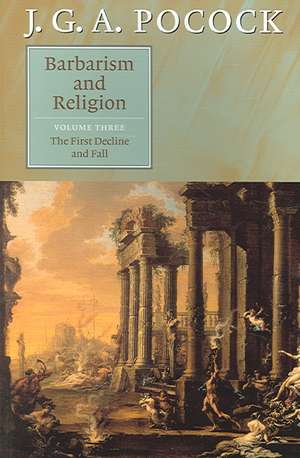Barbarism and Religion: Volume 3, The First Decline and Fall
Autor J. G. A. Pococken Limba Engleză Paperback – 26 oct 2005
| Toate formatele și edițiile | Preț | Express |
|---|---|---|
| Paperback (1) | 392.62 lei 43-57 zile | |
| Cambridge University Press – 26 oct 2005 | 392.62 lei 43-57 zile | |
| Hardback (1) | 616.78 lei 43-57 zile | |
| Cambridge University Press – 4 iun 2003 | 616.78 lei 43-57 zile |
Preț: 392.62 lei
Nou
Puncte Express: 589
Preț estimativ în valută:
75.15€ • 81.66$ • 63.17£
75.15€ • 81.66$ • 63.17£
Carte tipărită la comandă
Livrare economică 21 aprilie-05 mai
Preluare comenzi: 021 569.72.76
Specificații
ISBN-13: 9780521672337
ISBN-10: 0521672333
Pagini: 544
Dimensiuni: 162 x 229 x 32 mm
Greutate: 0.85 kg
Editura: Cambridge University Press
Colecția Cambridge University Press
Locul publicării:Cambridge, United Kingdom
ISBN-10: 0521672333
Pagini: 544
Dimensiuni: 162 x 229 x 32 mm
Greutate: 0.85 kg
Editura: Cambridge University Press
Colecția Cambridge University Press
Locul publicării:Cambridge, United Kingdom
Cuprins
Introduction; Prologue: 1. Gibbon's first volume: the problem of the Antonine moment; Part I. The First Decline and Fall: Ancient Perceptions: 2. Alibi quam Romae: the Tacitean narrative; 3. The Gracchan explanation: Appian of Alexandria and the unknown historian; 4. The construction of Christian empire; Part II. The Ambivalence and Survival of Christian Empire: 5. Orosius and Augustine: the formation of a Christian anti-history; 6. Otto of Freising and the two cities; 7. The historiography of the translatio imperii; Part III. The Humanist Construction of Decline and Fall: 8. Leonardo Bruni: from translatio to declinatio; 9. Flavio Biondo and the decades of decline; 10. Niccolo Machiavelli and the imperial republic; Part IV. Extensive Monarchy and Roman History: 11. Pedro Mexia: empire and monarchy; 12. History in the western monarchies: barbarism, law and republican survivals; 13. Lipsius and Harrington: the problem of arms in ancient and modern monarchy; Part V. Republic and Empire: The Enlightened Narrative: 14. European Enlightenment and the Machiavellian moment; 15. The French narrative: I: Boussuet and Tillemont, II: Montesquieu and Beaufort; 16. The Scottish narrative: I: David Hume and Adam Smith, II: Adam Ferguson's history of the republic; Part VI. Gibbon and the Structure of Decline: 17. The Antonine moment; 18. The Severi and the disintegration of the principate; 19. The Illyrian recovery and the new monarchy; Epilogue; 20. The Constantinean moment.
Recenzii
'This volume is every bit as persuasive as its predecessors and, perhaps because it is as much recit as the others were peintures, it is also rather more compelling a read. More than the first two volumes of his work, volume three of Barbarism and Religion leaves one hanging; like Gibbon and his first readers, we are only at the Milvian Bridge, pondering what will follow with Constantine. One hopes that, unlike those readers, we will not have to wait five years for the next episode.' Daniel Woolf, The American Historical Review
'It is, in every respect, a masterwork. … Of books about our shared undertaking, about the practice and historical importance of Roman studies, this is the finest I know.' C. Ando, University of Southern California
'This is a … rewarding book, requiring the reader to mediate on long quotations from the sources as well as to follow a complex argument … The most important thing to say, though, is that this is a work of great intellectual power and distinction, its complex and subtle argument firmly under control, a long book yet one in which every sentence counts.' The European Legacy
'It is, in every respect, a masterwork. … Of books about our shared undertaking, about the practice and historical importance of Roman studies, this is the finest I know.' C. Ando, University of Southern California
'This is a … rewarding book, requiring the reader to mediate on long quotations from the sources as well as to follow a complex argument … The most important thing to say, though, is that this is a work of great intellectual power and distinction, its complex and subtle argument firmly under control, a long book yet one in which every sentence counts.' The European Legacy
Notă biografică
Descriere
The third in a sequence of works by John Pocock designed to situate Edward Gibbon in a series of contexts in the history of Europe.
